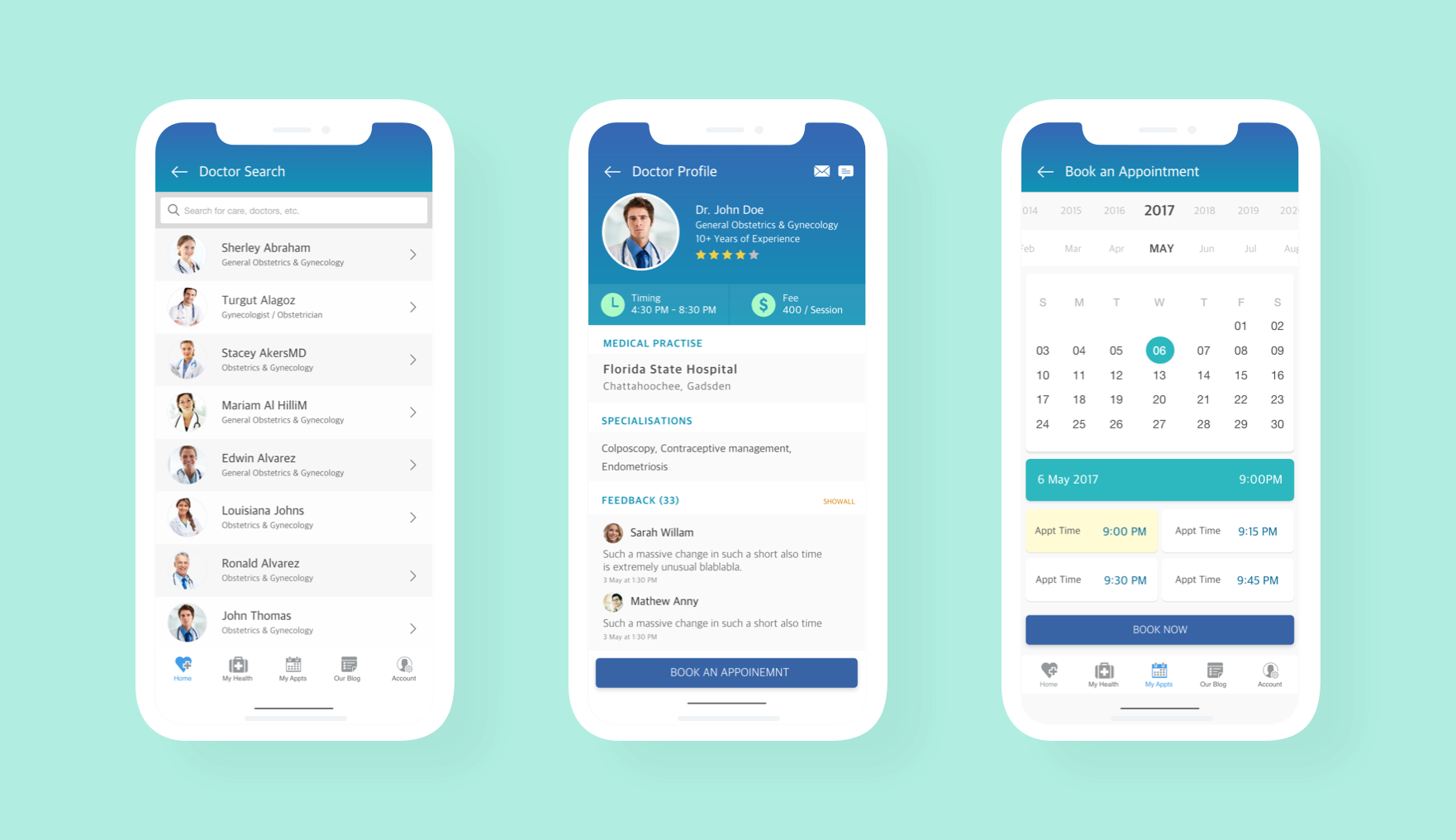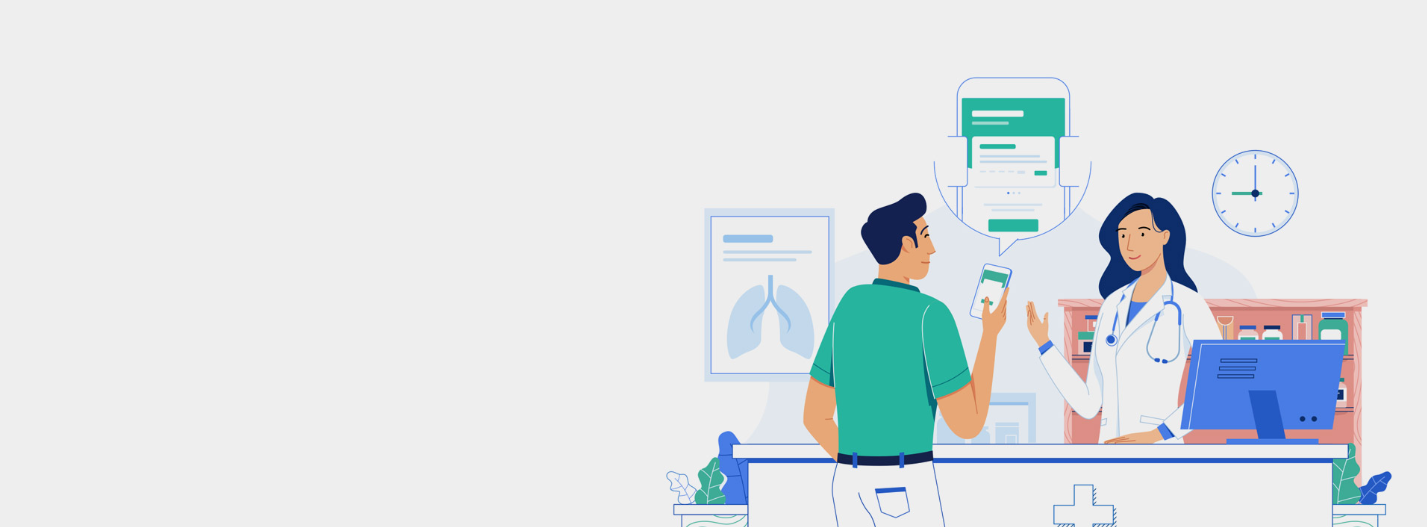- Home
- >
- Our Industries
- >
- Healthcare

Solutions for bettering medical care and patient services
Scalable healthcare app development necessitates industry-specific knowledge. By 2022, the market for health care applications is estimated to reach $133 billion. The widespread acceptance of apps has been a boon to the healthcare business, benefiting both consumers and doctors by providing an interface to connect in a more straightforward method to address most concerns.
Why choose InApps as your partner?
Top leading
Since 2016, InApps has been recognized as one of the top mobile app development companies on Clutch and GoodFirms.
Dedicated Team
When you work with us, you will have access to a dedicated team of mobile & web app developers, Business Analysts, UX/UI designers, Quality Testers, and Product Managers.
Experienced Developers
Our team of professional mobile and web application developers has 5+ years of experience and expertise in the Healthcare industry.
Custom and Intuitive experiences
We don’t believe in a one-size-fits-all strategy. Each application is tailor-made to meet the specific requirements of each organization. With totally designed apps, we help you exceed your rivals.
Our healthcare app development services

Technology Consultation
Healthcare app developers and experienced consultants for effective technology implementation—mobile app and website development, EHR solution, Healthcare CRM, legacy system modernization, cloud migration, process automation, and so on.

Healthcare Mobile App
HIPAA-compliant healthcare mobile app solutions include eConsultation, EHR synchronization, secure payments, IoT-enabled activity tracking, wearable connection, audio-video messaging, and diagnostics that protect physician and patient safety.

Healthcare Web App
User-friendly, fast-loading, dynamic, mobile-responsive online application—doctor and patient portal, appointment booking, specialty information, healthcare CMS, review platform, blog, and helpdesk.

mPrescription app
App for e-prescribing that simplifies prescription management and reduces pharmaceutical mistakes. Development of Android, iOS, and online healthcare applications for recording, viewing, and sharing medical prescriptions, health vitals, and allergy histories.

Laboratory Management App
Healthcare mobile app development solution for all diagnostic laboratories to handle patient sample collection, appointments, sending e-mail and push notifications before appointments, viewing/sharing lab findings, etc.

Medical Chatbots
Medical Chatbots are Artificial Intelligence-powered Virtual Assistants that automate patient outreach, preliminary symptom diagnosis, patient engagement, reminders, invoicing, and registration to relieve the burden on frontline healthcare professionals.
What advantages does the mobile health app provide?
Mobile health applications enable both patients and clinicians to get the information they need quickly and on the go. Furthermore, mobile applications can make use of the built-in functionality of smartphones and tablets to help monitor patients’ health (e.g., count steps using a gyroscope), deliver care (e.g., use a camera for telemedicine appointments), improve care efficiency (e.g., sending sound alerts to the doctor in the event of abnormal vitals), and so on.
What features of a mHealth app should be included?
Mobile health applications enable both patients and clinicians to get the information they need quickly and on the go. Furthermore, mobile applications can make use of the built-in functionality of smartphones and tablets to help monitor patients’ health (e.g., count steps using a gyroscope), deliver care (e.g., use a camera for telemedicine appointments), improve care efficiency (e.g., sending sound alerts to the doctor in the event of abnormal vitals), and so on.
The essential mHealth elements include vitals and symptoms tracking, medication planning and tracking, patient-doctor communication (e.g., message-based and audiovisual communication), and offline appointment booking.
What are the costs and timeline for developing a medical app?
Mobile health applications enable both patients and clinicians to get the information they need quickly and on the go. Furthermore, mobile applications can make use of the built-in functionality of smartphones and tablets to help monitor patients’ health (e.g., count steps using a gyroscope), deliver care (e.g., use a camera for telemedicine appointments), improve care efficiency (e.g., sending sound alerts to the doctor in the event of abnormal vitals), and so on.
The essential mHealth elements include vitals and symptoms tracking, medication planning and tracking, patient-doctor communication (e.g., message-based and audiovisual communication), and offline appointment booking.
The costs and dates vary based on the necessary application functionality and integration complexity. A simple patient or telemedicine application for a hospital (including appointment scheduling capability, PHI access, and remote consultations) will cost $150,000 and be ready in four months.
Mobile health applications enable both patients and clinicians to get the information they need quickly and on the go. Furthermore, mobile applications can make use of the built-in functionality of smartphones and tablets to help monitor patients’ health (e.g., count steps using a gyroscope), deliver care (e.g., use a camera for telemedicine appointments), improve care efficiency (e.g., sending sound alerts to the doctor in the event of abnormal vitals), and so on.
The essential mHealth elements include vitals and symptoms tracking, medication planning and tracking, patient-doctor communication (e.g., message-based and audiovisual communication), and offline appointment booking.
The costs and dates vary based on the necessary application functionality and integration complexity. A simple patient or telemedicine application for a hospital (including appointment scheduling capability, PHI access, and remote consultations) will cost $150,000 and be ready in four months.










